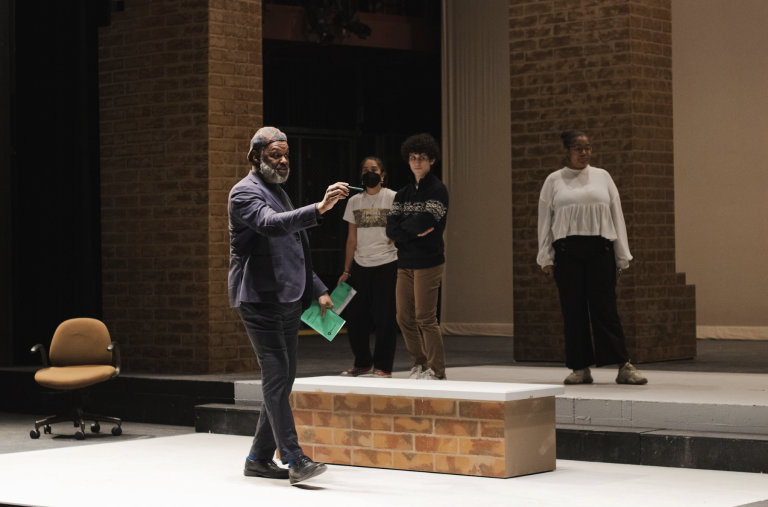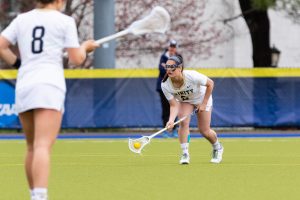Ben Gambuzza ’20
Contributing Writer
Trinity’s Chapel is all-in on celebrating 50 years of coeducation. In the Trinity College Chapel this Sunday, Mar. 8 at 4:00 p.m., the Chapel Singers will perform their repertoire of works written largely by women composers. As a part of the Women at the Summit campaign, the group is challenging the historically male-dominated canon of sacred music composers. The program is also geographically diverse and showcases living composers. Among them are Kerry Andrew (England), Eva Ugalde (Spain), Dobrinka Tabakova (Bulgaria), and Rosephayne Powell (America).
The concert will end with a transcendent and furious setting, sung in French, of Psalm 24 by the revolutionary composer Lili Boulanger. Boulanger worked in France and was the first woman to win the Prix de Rome, a prestigious composition prize, in 1913. Many of her works are free-flowing, light, airy, and evocative of the blurry post-impressionist paintings that were being produced around her at the time. But Psalm 24 is a little different. Although it has the unmistakable sound of Boulanger, it is more insistent and rhythmically driving, almost apocalyptic. She especially pushes the basses to the very top of their range, making them sing a high-E, which gives a terrifying effect. As if that wasn’t enough, the piece ends with the organ and choir singing full-blast: “Ah!” It is a blood-curdling scream, sung in tune of course. Her use of open fifths give the minor-key piece a dominating fire that is sure to turn the heads of audience members who may have been wooed and hypnotized by the program’s preceding music.
Much of the music besides Psalm 24 has a multifarious sort of freedom. Some pieces, like Kerry Andrew’s Lux Beata Trinitas, feature passages where every member of the choir is singing a variation on a short melody, but at different times. The result is a canon with no structure, which is controlled by each individual member of the choir. It is like a soup of sound which, if you close your eyes and sit back in your pew, has the potential to lull you into a trance. Although there are pieces on the program, like Andrew’s, which value the sound of harmonies over rhythmic complexity, Powell’s “The Word Was God” is a piece you can snap your fingers to (but please don’t). This is a jazz-influenced piece that treats the choir like a drum kit. Make no mistake, there are breathtaking harmonies that will surprise you. But Powell’s use of syncopation in the melodic lines of the upper voices and the percussive accompaniment of the basses is the most apparent and exciting feature of this piece.
Behind the pieces on the program, which are unconventional indeed, is, of course, the choir. Before Trinity went co-ed in 1969, the choir was obviously all-male. Before coeducation, as John Rose College Organist-and-Directorship and Distinguished Chair of Chapel Music Christopher Houlihan tells me, the college’s choral groups collaborated with other area choirs to sing pieces featuring women singers. Houlihan wonders “what that experience must have been like for the group,” since having women in the choir opened new possibilities for repertoire, much of which includes both male and female voices.
In the bastion of “serious” music (orchestras, choirs, operas), the paying-public often values choral warhorses by male composers like Mozart, Verdi, Rossini, Bach, or Berlioz over works by women, which everyone knows. But this program is special because it programs a variety of new works. This are no premieres, but many feature choral techniques that are simply refreshing to the ears. Actually, if there were one word to describe this concert, it may be “refreshing.”
Emily Wertheimer ’20, an alto in Chapel Singers, added that “as a female musician and music student, it is truly refreshing to have the opportunity to study and perform works composed by women, a group largely marginalized in the world of classical music.” Hadley Quieroz ’20, a soprano in Chapel Singers, as well as one of the group’s co-presidents, voiced a similar idea, saying that the concert will have “a genuinely unique sound. Some of the pieces are challenging in a way we haven’t explored before…I hope we can incorporate more works by female composers in our future repertoire.”
Hadley hits on a crucial point. Women at the Summit and all its associated events, including this Sunday’s concert, is a celebration of genuine achievement. However, this cannot be an anomaly. 2019-2020 cannot be the only year of celebrating women. I am channeling Jen Doll, writing in The Atlantic. She says of International Women’s Day that it “shouldn’t be a symbolic day, it should be the way we live.” Likewise, programming the music of women composers should not be a special event, but a continuing effort to achieve equal representation in musical repertoire, as in all aspects of American life.






+ There are no comments
Add yours